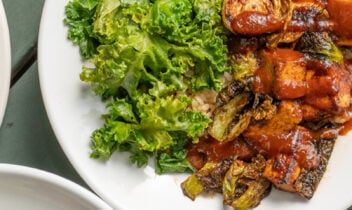Performance Nutrition: Does It Really Matter What You Eat After A Workout?
Andrew Dole, RDN
Everyday Chef & Performance Nutrition Expert, Fruits & Veggies—More Matters Full Bio

There are a lot of supplements and nutrition recommendations aimed at getting you to eat after a workout. Research has been done on this topic involving elite athletes, and the benefits to a well-timed meal are real. However, post-workout meals might not be what’s best for you. Here’s what you should know about nutrient timing and how to make it work for your goals.
What is nutrient timing?
The concept of nutrient timing is based around eating a combination of protein and carbohydrate before or after exercise. Protein is the primary nutrient for muscle building and repair. Carbohydrates are the body’s primary fuel source for all but a few sporting disciplines. Pairing these two important nutrients together and consuming them at the right times provides signals to the body to repair, build, and refuel.
Eating after exercise, why?
Eating protein and carbohydrates after exercising replaces used up energy and provides protein building blocks needed to repair damaged muscles. Research shows that the body will be more receptive to rebuilding and refueling after exercise; often referred to as the “anabolic window.”
What new research tells us.
The “anabolic window” or the optimal repair and refueling time was thought to only happen after exercising. New research tells us that pre-workout meals can provide the same positive effects, because for two hours after eating the body is in the “anabolic window.”
Should I eat after exercise?
If you haven’t had a meal for 3-4 hours, yes, eat after exercising. Otherwise, feel confident that a well-balanced meal 1-2 hours before exercising is just as good. There is no need to take on extra calories for the sake of it.
How To Make Nutrient Timing Work For You
- Exercise 1-2 hours after eating a meal and the body will continue to benefit from the food afterwards.
- Eat within 60-90 minutes of completing exercise if: exercising “fasted” (after waking up), or it has been 3-4 hours since the last meal.
- If your goal is weight loss, be cautious of post-workout shakes and bars. Eating after exercise to gain benefits already provided from a regular meal can add back the calories just burned; frustrating!
- Eating a lot of carbohydrates after exercise is really only useful for competitive athletes with two intense efforts in one day and less than eight hours in between.
References
- Aragon AA, Schoenfeld BJ. “Nutrient timing revisited: is there a post-exercise anabolic window?” J Int Soc Sports Nutr. 2013;10(1):5.
- Rosenbloom CA, Coleman EJ. “Sports Nutrition, A Practice Manual for Professionals.” American Dietetic Association; 2012.


